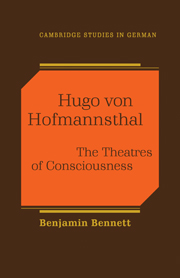Book contents
- Frontmatter
- Contents
- Preface
- Acknowledgments
- List of Abbreviations
- Part I Principles of lyric and drama
- Part II Language and society
- Part III Culture and collapse
- 13 Art by accident
- 14 The allomatic
- 15 The rôle of “Vorwitz” in Das Salzburger Groβe Welttheater
- 16 Salzburg as a theater
- 17 Goethe, Nietzsche, Thomas Taylor and Der Turm
- 18 A tower in ruins: the tragedy of a tragedy
- Conclusion
- Notes
- Index of works
- General index
16 - Salzburg as a theater
Published online by Cambridge University Press: 04 August 2010
- Frontmatter
- Contents
- Preface
- Acknowledgments
- List of Abbreviations
- Part I Principles of lyric and drama
- Part II Language and society
- Part III Culture and collapse
- 13 Art by accident
- 14 The allomatic
- 15 The rôle of “Vorwitz” in Das Salzburger Groβe Welttheater
- 16 Salzburg as a theater
- 17 Goethe, Nietzsche, Thomas Taylor and Der Turm
- 18 A tower in ruins: the tragedy of a tragedy
- Conclusion
- Notes
- Index of works
- General index
Summary
The response to tradition in the Groβes Welttheater is similar to that in Jedermann, but combined with a more cohesive metaphysical vision; the metaphysics is similar to that of Der Tor und der Tod, except for a focus on ethical rather than ritual implications; the ethical fable of Die Frau ohne Schatten is taken over, yet stripped of its presumed applicability as prescriptive doctrine. But what is the Groβes Welttheater in itself? Does it offer a solution to the problems that arise in the neighborhood of Der Schwierige, especially the Sacramozo-problem? Perhaps the strict disjunction between truth and its ethical application is an artistic method, as it were, of making room for the truth, permitting it to be known directly. Or perhaps, by awakening our ethical concerns but denying them any philosophical basis, the play leaves us no choice but to build a life out of the particular social norms and usages that surround us, and so operates against the intellectual fragmentation of society. In order to clarify this matter, we must understand a bit more about Hofmannsthal's view of Salzburg.
In the popular mind Jedermann, more than any other play, is associated with the Salzburg Festival. But although the genesis of Jedermann probably owes a certain amount to Reinhardt's influence, and although the idea of festival productions in Salzburg had been floating around among Hofmannsthal's associates since at least 1903, still the Salzburg play, for Hofmannsthal, which in every step of its conception, genesis, and realization is intimately connected with the exigencies of an existing Festival program, is Das Salzburger Groβe Welttheater.
- Type
- Chapter
- Information
- Hugo von HofmannsthalThe Theaters of Consciousness, pp. 287 - 302Publisher: Cambridge University PressPrint publication year: 1988



